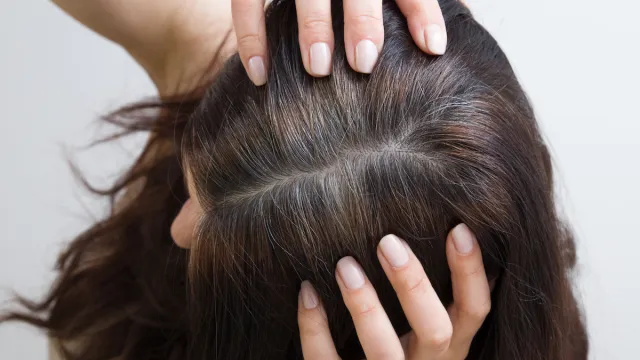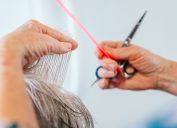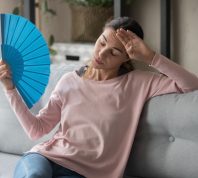17 Surprising Signs Your Hair Will Go Gray
Genetics isn't the only factor determining your salt and pepper ratio, doctors say.
Once you see silver and white strands popping up in your hair, there's nothing much that can reverse the process, save for a box of hair dye. But there are warning signs your hair will go gray, some of them biological, some of them based on lifestyle. And if you spot them early enough—or learn what not to do if you want to preserve your natural locks—you may be able to slow things down. Keep reading to hear from doctors and hair experts about all the surprising signs that gray hair is in your future.
RELATED: 7 Benefits of Letting Your Hair Go Gray, According to Stylists.
17 Signs Your Hair Will Go Gray
1. You're constantly stressed.
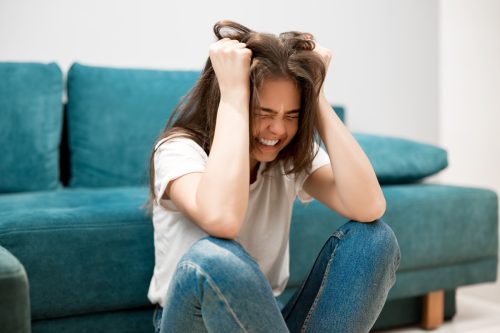
According to Karla Robinson, MD, medical editor at GoodRx, preliminary research in mice suggests that high levels of stress can cause hair to turn gray prematurely.
"Researchers determined that this was happening because of the stress hormone noradrenaline, which damaged the cells in hair follicles responsible for pigment. Without these pigment-producing cells, the mice's hair turned gray," she explains.
However, she says to keep in mind that this study was done on mice and not humans: "And other studies featuring humans had very small sample sizes, so it's difficult to say with certainty that stress causes premature graying."
2. You've experienced trauma.

According to Scientific American, a traumatic event can affect your whole body—even damaging your hair follicles. Basically, an incredibly stressful event can generate a swarm of free radicals in your hair follicles, which travel along the hair shaft, destroying its pigment in a manner that appears similar to a bleaching effect.
3. You're white.

Your race and ancestry are some of the biggest factors that contribute to going gray.
"For example, if you're white, graying begins during your mid-30s, while those of Asian descent will see this process start in their late 30s instead. And people of African ancestry usually won't see gray hairs until their mid-40s," explains Robinson. "This is likely because of differences in melanin content, hair thickness, and shape of the hair shaft between ethnicities. This may trigger graying in some people earlier than others."
RELATED: How to Go Lighter to Cover Your Grays, According to Stylists.
4. You spend too much time in the sun.

You probably know how to protect your skin from the sun, but did you know UV rays also can speed up the graying process?
"This is because the UV rays increase oxidative stress in hair follicles," notes Robinson. "When this happens, there are more free radicals in the hair follicles that could cause them to lose pigment and turn gray."
To prevent this, wear a hat when you're out in the sun or use a hair cream or spray that protects against UVA/UVB exposure.
5. You drink a lot of alcohol.

Though it's not entirely clear how much alcohol consumption triggers graying, it very well could be a factor, according to Robinson. "It's thought to be due to the inflammation and oxidative stress that is triggered by alcohol," she notes.
6. You smoke.
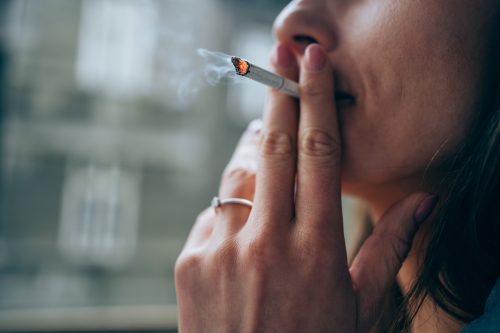
Along with the myriad other health risks of smoking, the habit can also cause you to go gray early.
According to a 2021 study, "Ambient tobacco smoke exposure results in nicotine accumulation in hair follicles and the hair shaft."
This then damages the cell, and, in turn, decreases the amount of melanin present, potentially causing the hair to turn gray, explains Robinson.
RELATED: 7 Secrets for Growing Out Gray Hair, According to Stylists.
7. You're exposed to air pollution.

According to Ghanima Abdullah, a cosmetologist at The Right Hairstyles, environmental pollution can cause premature graying.
"The presence of hydrogen peroxide in the hair follicles can damage melanocytes and stop melanin production in the hair follicle, causing colorless (gray) hair," she explains. "Hydrogen peroxide can normally be found in hair follicles, but it's broken down by the enzyme catalase. When either the quantity of hydrogen peroxide is too much or the amount of catalase is too little or impaired, gray hair can result."
And air pollution "affects the melanocytes and causes the accumulation of hydrogen peroxide," she notes.
8. You use heat tools.
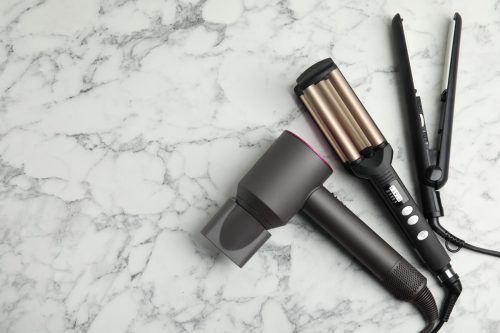
Years and years of blowdrying, curling, or straightening your hair can catch up to you.
"Excessive styling can weaken the hair structure and might interfere with melanin production," points out Krysta Biancone, co-founder of Amari Salon & Spa and hairstylist at Hair by Krysta.
9. You dye your hair a lot.
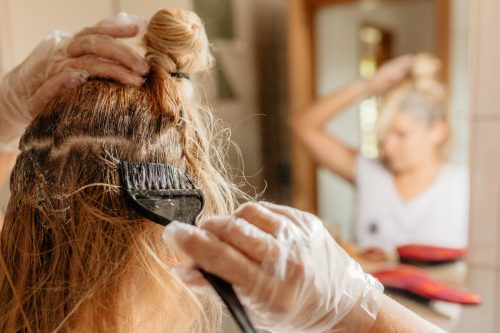
Similar to using heat tools, undergoing a lot of chemical treatments can also interfere with melanin production, notes Biancone.
"Permanent hair dyes and bleaching treatments use developers that contain hydrogen peroxide," adds Abdullah. "If chemical treatments with hydrogen peroxide are used frequently enough, they can spark gray hairs."
RELATED: 6 Tips If You Have Thinning Eyebrows, According to Beauty Experts.
10. You shed hair often.
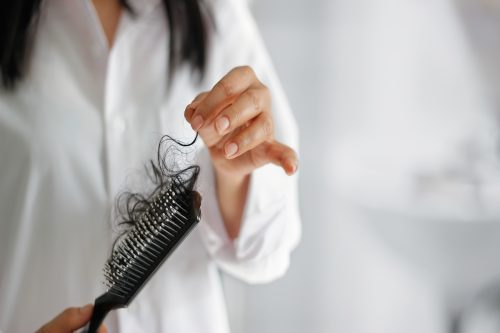
If you're over the age of 35 and you tend to shed your hair quite often, then there's a likely chance that the hair set to replace the old strands will be gray.
"As people age, hair density often decreases," explains Biancone. "While this doesn't directly cause graying, it's a sign that the natural aging process is affecting the hair, and graying might be on the horizon."
11. Your hair is coarser than before.
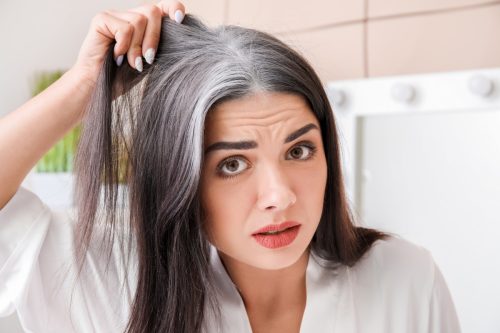
The gray hair that assembles to replace the old, pigmented hair follicles tends to be more brittle and coarse. "This is because the natural oil production in the scalp decreases with age, leading to drier hair," notes Biancone.
So, if you've begun to notice a change in the texture of your hair, this could be pointing to impending gray hair.
12. You're missing key nutrients in your diet.
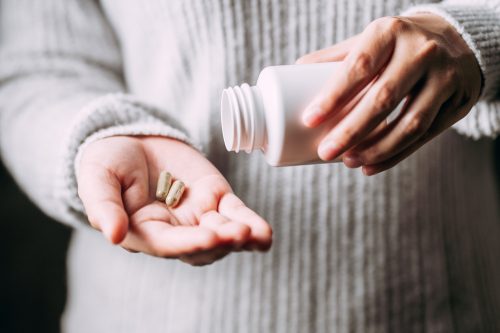
If you have a poor diet or are missing key nutrients in your current health regimen, then you might be more likely to spot gray strands.
"Various studies have shown that a lack of Vitamin B12 can turn hair white prematurely," Anabel Kingsley, a trichologist at Philip Kingsley, told Good Housekeeping.
B12 is mainly found in poultry, meat, fish, and dairy products, so those who follow a vegan or vegetarian diet might be more susceptible to this vitamin deficiency.
Kinglsey also noted that stress can deplete your body of vitamin B12.
RELATED: What Happens If You Don't Wash Your Hair for a Week, According to Doctors.
13. You've had chemotherapy.
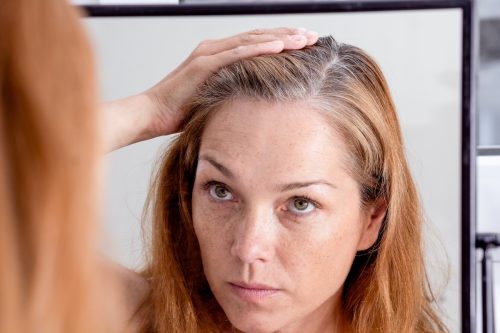
Chemotherapy drugs attack cancer cells in your body, but, as the Mayo Clinic explains, they also "attack other rapidly growing cells in your body—including those in your hair roots."
Not only does this cause hair loss in many patients, but it also can cause hair to grow back with a different texture or gray. "It might be curlier than it was before, or it could be gray until the cells that control the pigment in your hair begin functioning again," the Mayo Clinic says.
14. You have hypothyroidism.
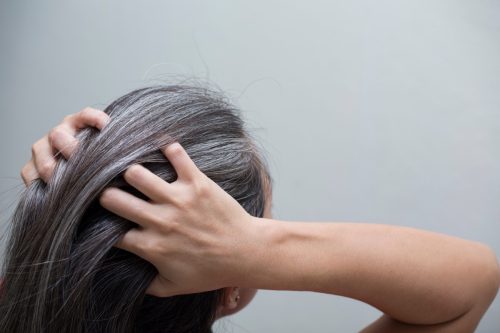
"Hypothyroidism, also known as an underactive thyroid, is when your thyroid gland does not produce enough thyroid hormone to maintain a healthy metabolic rate," explains Paloma Health. "Because every cell relies on thyroid hormone, there are numerous symptoms associated with hypothyroidism."
One of these symptoms is graying hair. When hair follicles have a decreased metabolism, they shed more and then take longer to grow back, notes Paloma Health. "And when the hair does grow back, it is often brittle, thin, and lacking in color," they add.
15. You have vitiligo.
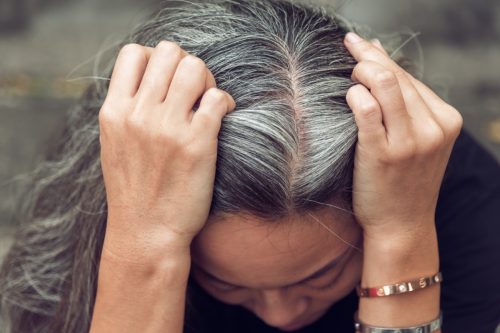
"Commonly, someone with an autoimmune disorder will see changes to their hair because the body is being depleted of its necessary nutrients," says Becca Raziuddin, director of artist education at Blo Blow Dry Bar. One example is vitiligo.
While this skin condition is not life-threatening, it can greatly alter the appearance of your skin and hair, often causing premature graying in certain spots of your scalp. This is due to vitiligo's effects on the cells that produce melanin, which often causes them to die or stop functioning, according to the Mayo Clinic.
Vitiligo may also cause your eyelashes, eyebrows, or beard to go prematurely gray, they note.
RELATED: 10 Ways to Make Your Gray Hair Soft and Shiny, According to Stylists.
16. You have heart disease.
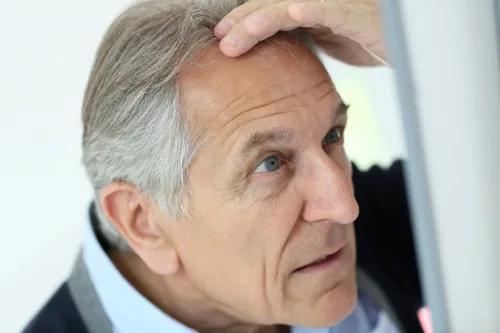
According to a study presented at the European Society of Cardiology's annual congress, the "hardening and narrowing of one's arteries, called atherosclerosis, and the graying of hair both rely on similar mechanisms," per USA Today. This means that if you're at risk for developing a heart condition—or if you already have been diagnosed with one—your chances of developing gray hair are much greater.
Additionally, the study pointed to the astonishing fact that graying hair could also signify a heart condition, as a large percentage of the 545 men tested with gray hair presented early signs of heart disease.
17. Your parents went gray early.

In a 2016 study published in Nature Communications, researchers found the primary gene involved with premature graying—IRF4. This gene is in charge of regulating and producing melanin. When your body starts producing less melanin, it causes your hair to turn gray. Therefore, if your parents went gray early, genetics will likely dictate that you will, too.
For more wellness advice delivered straight to your inbox, sign up for our daily newsletter.
- Source: https://www.nature.com/articles/s41586-020-1935-3
- Source: https://www.ncbi.nlm.nih.gov/pmc/articles/PMC8280411/
- Source: https://www.mayoclinic.org/drugs-supplements-vitamin-b12/art-20363663
- Source: https://www.mayoclinic.org/tests-procedures/chemotherapy/in-depth/hair-loss/art-20046920
- Source: https://www.mayoclinic.org/diseases-conditions/vitiligo/symptoms-causes/syc-20355912
- Source: https://www.nature.com/articles/ncomms10815
